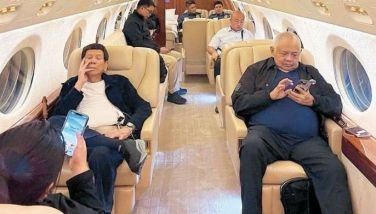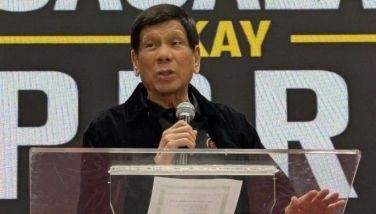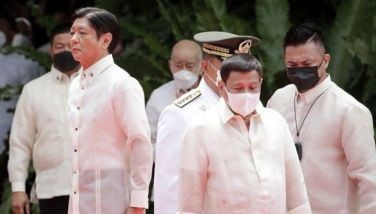Hands off KB case, 5 SC justices asked
May 17, 2003 | 12:00am
Sen. Panfilo Lacson asked yesterday five Supreme Court (SC) justices appointed by President Arroyo to inhibit themselves from the Kuratong Baleleng rubout case.
The SC had paved the way for the revival of the case last April 1.
Lacson said Justices Renato Corona, Ma. Alicia Austria-Martinez, Conchita Morales, Adolfo Azcuna and Romeo Callejo Sr. should not participate in deliberations on the case to dispel perceptions that the senator is being persecuted by the Arroyo administration.
He said "the circumstances of this case behoove the mentioned justices to decline to take part in what will certainly be perceived by the people as executive interference."
In a seven-page petition, Lacson cited the political implications of the SC ruling now that he is running for president in the 2004 national elections.
Lacson said he is "at the forefront of the democratic opposition of the Philippines and the complete reversal of the unanimous May 28, 2002 decision by a significantly altered court with newly appointed magistrates under a new administration, smacks of partiality and political prejudice."
Lacson branded the reopened Kuratong Baleleng case as one of "countless criminal investigations by subalterns of this administration" that make him a "target of persistent political ballistics."
He said it was the "unshirkable duty" of the SC justices concerned "to preserve the independence of the court" by "keeping the gate to the political thicket closed."
In a 29-page decision penned by Callejo, the SC granted the motion for reconsideration that sought the reopening of the Kuratong Baleleng rubout case filed by the government and set aside the May 28, 2002 ruling that remanded the case to the Quezon City Trial Court without dealing with substantive issues.
The case was first filed before the Quezon City RTC when Lacson was still chief of the Presidential Anti-Organized Crime Task Force (PAOCTF) set up in the mid-1990s by then Vice President Joseph Estrada.
All the five justices Lacson sought to inhibit from the case voted for the reopening of the case along with SC Chief Justice Hilario Davide Jr., Associate Justices Josue Bellosillo, Vicente Mendoza, Artemio Panganiban and Leonardo Quisumbing.
Those who voted against were SC Associate Justices Reynato Puno, Jose Vitug, Consuelo Ynares-Santiago and Angelina Sandoval Gutierrez, while Antonio Carpio inhibited himself from the case.
Lacson first sought the recusation of Callejo, which the SC denied on April 29. Lacson’s petition then was seen as "downright irresponsible," as his petition insinuated that the SC was manipulated by politics.
In his motion seeking the inhibition of the five SC magistrates, Lacson said there were serious doubts about the judiciousness of the April 1 ruling because Corona, Martinez, Morales, Azcuna and Callejo were not yet present at the earlier SC deliberations. He said this was "a complete departure from basic precepts of the Philippine Constitution and the rule of law."
The senator’s lawyers said the SC should apply Circular No. 99-8-09-SC, which disqualifies a new member of the court from acting as ponente in an action discussed, argued and threshed out before his or her appointment.
Lacson said he believes his rights under the Bill of Rights were violated despite the power of the state to prosecute and give justice to all concerned in all cases.
According to him, only "when this honorable court complie(s) with its own internal regulations" by inhibiting Corona, Martinez, Morales, Azcuna and Callejo will he "be relieved of the impression that the judiciary is susceptible to the vagaries of politics, influence peddling, the padrino system, and the subservience of the judiciary to the executive branch of government."
The SC had paved the way for the revival of the case last April 1.
Lacson said Justices Renato Corona, Ma. Alicia Austria-Martinez, Conchita Morales, Adolfo Azcuna and Romeo Callejo Sr. should not participate in deliberations on the case to dispel perceptions that the senator is being persecuted by the Arroyo administration.
He said "the circumstances of this case behoove the mentioned justices to decline to take part in what will certainly be perceived by the people as executive interference."
In a seven-page petition, Lacson cited the political implications of the SC ruling now that he is running for president in the 2004 national elections.
Lacson said he is "at the forefront of the democratic opposition of the Philippines and the complete reversal of the unanimous May 28, 2002 decision by a significantly altered court with newly appointed magistrates under a new administration, smacks of partiality and political prejudice."
Lacson branded the reopened Kuratong Baleleng case as one of "countless criminal investigations by subalterns of this administration" that make him a "target of persistent political ballistics."
He said it was the "unshirkable duty" of the SC justices concerned "to preserve the independence of the court" by "keeping the gate to the political thicket closed."
In a 29-page decision penned by Callejo, the SC granted the motion for reconsideration that sought the reopening of the Kuratong Baleleng rubout case filed by the government and set aside the May 28, 2002 ruling that remanded the case to the Quezon City Trial Court without dealing with substantive issues.
The case was first filed before the Quezon City RTC when Lacson was still chief of the Presidential Anti-Organized Crime Task Force (PAOCTF) set up in the mid-1990s by then Vice President Joseph Estrada.
All the five justices Lacson sought to inhibit from the case voted for the reopening of the case along with SC Chief Justice Hilario Davide Jr., Associate Justices Josue Bellosillo, Vicente Mendoza, Artemio Panganiban and Leonardo Quisumbing.
Those who voted against were SC Associate Justices Reynato Puno, Jose Vitug, Consuelo Ynares-Santiago and Angelina Sandoval Gutierrez, while Antonio Carpio inhibited himself from the case.
Lacson first sought the recusation of Callejo, which the SC denied on April 29. Lacson’s petition then was seen as "downright irresponsible," as his petition insinuated that the SC was manipulated by politics.
In his motion seeking the inhibition of the five SC magistrates, Lacson said there were serious doubts about the judiciousness of the April 1 ruling because Corona, Martinez, Morales, Azcuna and Callejo were not yet present at the earlier SC deliberations. He said this was "a complete departure from basic precepts of the Philippine Constitution and the rule of law."
The senator’s lawyers said the SC should apply Circular No. 99-8-09-SC, which disqualifies a new member of the court from acting as ponente in an action discussed, argued and threshed out before his or her appointment.
Lacson said he believes his rights under the Bill of Rights were violated despite the power of the state to prosecute and give justice to all concerned in all cases.
According to him, only "when this honorable court complie(s) with its own internal regulations" by inhibiting Corona, Martinez, Morales, Azcuna and Callejo will he "be relieved of the impression that the judiciary is susceptible to the vagaries of politics, influence peddling, the padrino system, and the subservience of the judiciary to the executive branch of government."
BrandSpace Articles
<
>
- Latest
- Trending
Trending
Latest
Trending
Latest
Recommended



























